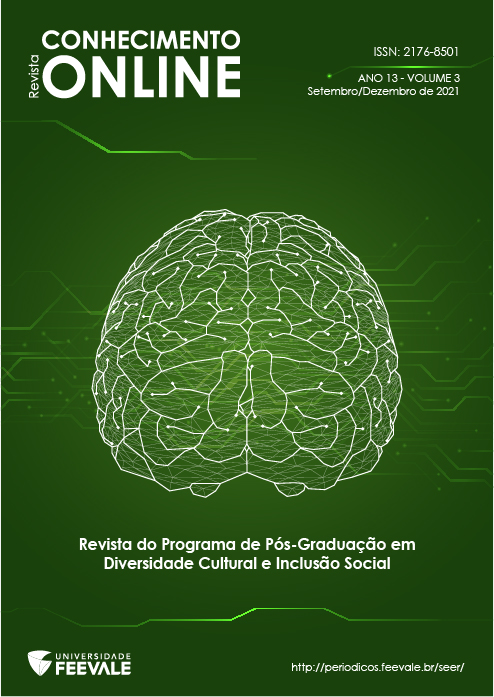EXPERIENCES OF INSERVICE TEACHERS FORMATION FOR CREATION AND USE OF DIGITAL TEACHING MATERIALS IN PANDEMIC TIMES
DOI:
https://doi.org/10.25112/rco.v3.2635Keywords:
education, Teacher training, Educational technologies, distance learningAbstract
The Covid-19 pandemic brought up issues that need to be addressed in teacher training. In addition to pedagogical knowledge and specific content, it is essential that graduates are able to articulate, in an intentional and meaningful way, digital technologies. In this context, the present work aims to evaluate the perception of teachers about the use of technologies and digital teaching materials. Data collection took place as follows: teachers answered an initial questionnaire, participated in a workshop and then answered another questionnaire. The data collected in the two instruments were discussed and compared using the theoretical framework TPACK. Based on the discussions held, it was found that teachers do not experience difficulties with specific content, which demonstrates that pedagogical and technological aspects need to be privileged in their training. In addition, after conducting the workshop, teachers showed far less concern with technological issues, which makes it possible to deduce that they showed insecurity with the use of technologies, and not necessarily a lack of skills with them.
References
ANDRADE, M. M. Introdução à metodologia do trabalho científico. São Paulo: Atlas, 2010.
BARDIN, L. Análise de Conteúdo. Lisboa: Edições 70, 2007.
BELLONI, M. L. Educação a distância. Campinas: Autores Associados, 2009.
BONAFINI, F. C.; LEE, Y. Investigating Prospective Teachers’ TPACK and their Use of Mathematical Action Technologies as they Create Screencast Video Lessons on iPads. TechTrends, 2021. Disponível em: https://doi.org/10.1007/s11528-020-00578-1. Acesso em: 22 abr. 2021.
BRASIL. Lei nº 13.005, de 25 de junho de 2014. Aprova o Plano Nacional de Educação – PNE e dá outras providências. Brasília: Diário Oficial da União, 2014. Disponível em: http://www.planalto.gov.br/ccivil_03/_ato2011-2014/2014/lei/l13005.htm. Acesso em: 22 abr. 2021.
BRASIL. Ministério da Educação, Secretaria de Educação a Distância. Referenciais de qualidade para a educação superior a distância. Brasília: MEC/Seed, 2007.
BRASIL. Lei nº 9.394, de 20 de dezembro de 1996. Estabelece as diretrizes e bases da educação nacional. Brasília: Diário Oficial da União, 1996. Disponível em: http://www.planalto.gov.br/ccivil_03/leis/l9394.htm. Acesso em: 22 abr. 2021.
CANDAU, V. M. A didática e a formação de educadores - Da exaltação à negação: a busca da relevância. In: CANDAU, V. M. (Org.). A Didática em Questão. Petrópolis: Vozes, 2011. p. 13-14.
CHIZZOTTI, A. Pesquisa em Ciências Humanas e Sociais. São Paulo: Cortez, 2010.
CONSELHO NACIONAL DE EDUCAÇÃO (CNE). Resolução CNE-CP nº 02, de 20 de dezembro de 2019. Define as Diretrizes Curriculares Nacionais para a Formação Inicial de Professores para a Educação Básica e institui a Base Nacional Comum para a Formação Inicial de Professores da Educação Básica (BNC-Formação). Brasília: Conselho Nacional de Educação, 2019. Disponível em: http://portal.mec.gov.br/index.php?option=com_docman&view=download&alias=135951-rcp002-19&category_slug=dezembro-2019-pdf&Itemid=30192. Acesso em: 22 abr. 2021.
DALAL, M.; ARCHAMBAULT, L.; SHELTON, C. Fostering the growth of TPACK among international teachers of developing nations through a cultural exchange program. Australasian Journal of Educational Technology, v. 37, n. 1, p. 43-56, 2021. Disponível em: https://ajet.org.au/index.php/AJET/article/view/5964/1674. Acesso em: 22 abr. 2021.
FILATRO, A. Como preparar conteúdos para EaD. São Paulo: Saraiva Educação, 2018.
GARBIN, M. C.; OLIVEIRA, É. T. Tecnologias, múltiplas linguagens e práticas pedagógicas na formação superior a distância. ETD - Educação Temática Digital, Campinas, v. 23, n. 1, p. 44–63, 2021. Disponível em: https://periodicos.sbu.unicamp.br/ojs/index.php/etd/article/view/8656122. Acesso em: 1 set. 2021.
GOZUM, A. I. C.; DEMIR, Ö. Technological pedagogical content knowledge self-confidence of prospective pre-school teachers for Science Education during the COVID-19 period: A Structural Equational Modelling. International Journal of Curriculum and Instruction, v. 13, n. 1, p. 712–742, 2021. Disponível em: http://ijci.wcci-international.org/index.php/IJCI/article/view/599/285. Acesso em: 21 abr. 2021.
IBERNÓN, F.; SHIGUNOV NETO, A.; SILVA, A. C. Reflexões sobre o conhecimento na formação de professores em comunidade de prática. Revista Iberoamericana de Educación, v. 82, n. 1, p. 161-192, 2020. Disponível em: https://rieoei.org/RIE/article/view/3663/4070. Acesso em: 20 abr. 2021.
KOEHLER, M. J.; MISHRA, P. Introducing TPCK. In: AMERICAN ASSOCIATION OF COLLEGES for Teacher Education [AACTE]. Handbook of Technological Pedagogical Content Knowledge (TPCK) for Educators. Routledge: New York and London, 2008. p. 3-10.
KOEHLER, M. J.; MISHRA, P. What happens when teachers design educational technology? The development of technological pedagogical content knowledge. Journal of Educational Computing Research, v. 32, n. 2, p. 131-152, 2005.
MARCONI, M. A.; LAKATOS, E. M. Fundamentos de metodologia científica. São Paulo: Atlas, 2010.
OLIVEIRA, É. T. EaD e ambientes virtuais de aprendizagem: dimensões Orientadoras para Seleção de Mídias. 2019. 177 p. Tese (Doutorado em Educação) – Faculdade de Educação, Universidade de São Paulo, São Paulo, 2019. Disponível em https://teses.usp.br/teses/disponiveis/48/48134/tde-04112019-163653/publico/EDISON_TROMBETA_DE_OLIVEIRA_rev.pdf. Acesso em: 1 set. 2021.
SHULMAN, L. Knowledge and Teaching Foundations of the New Reform. Harvard Educational Review, v. 57, n. 1, p. 1-22, 1987.
SILVA, G. F.; MACHADO, J. A. Saberes em diálogo: a construção de um programa de formação docente em uma rede municipal de ensino. Revista Iberoamericana de Educación, v. 77, n. 2, p. 95-114, 2018. Disponível em: https://rieoei.org/RIE/article/view/3161/3978. Acesso em: 20 abr. 2021.
WANG, Y.; GU, X.; LIU, S. The Investigation and Analysis of Pre-Service Teachers Toward TPACK Competencies. Open Journal of Social Sciences, v. 8, n. 12, 2020. Disponível em: https://www.scirp.org/journal/paperinformation.aspx?paperid=106127. Acesso em: 22 abr. 2021.
Downloads
Published
How to Cite
Issue
Section
License
Copyright (c) 2021 Edison Trombeta de Oliveira, Monica Cristina Garbin, Nadia Rubio Pirillo

This work is licensed under a Creative Commons Attribution 4.0 International License.
• Os autores mantêm os direitos autorais e concedem à revista o direito de primeira publicação com o trabalho licenciado sob a Licença Creative Commons - Attribution 4.0 International (CC BY 4.0).
• Os autores são estimulados a publicar e distribuir seu trabalho online (ex.: em repositórios institucionais ou na sua página pessoal), pois isso pode aumentar o impacto e a citação do trabalho publicado.


